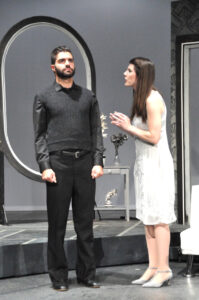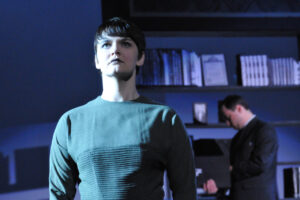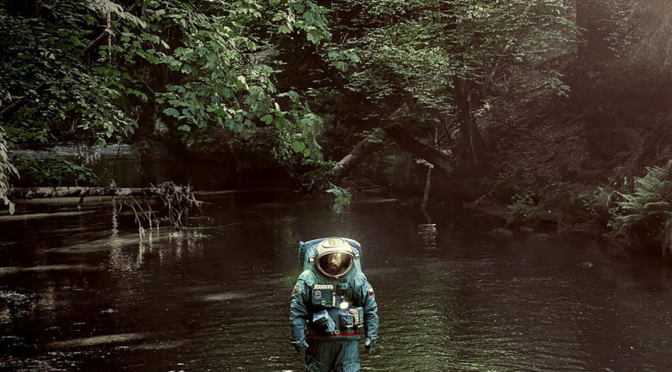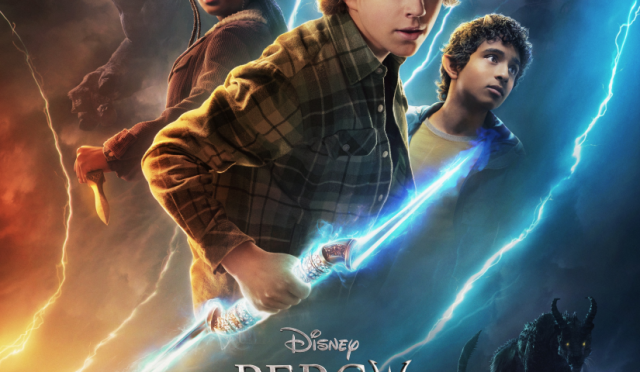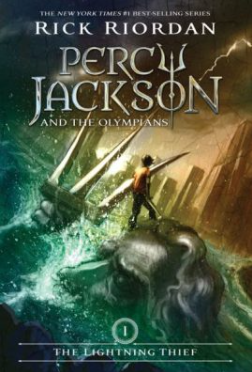Back in 2011, Seth saw the original Percy Jackson movie in the theater with his 9 year old son. He then sat down at his keyboard and pounded out 2500 words about why it sucked, comparing it, more extensively than he remembered, to The Bourne Identity. This is that post, slightly edited and editorialized by 2024 Seth:
(Let me preface this by saying I’m no expert on screenwriting. I just know bad screenwriting when I see it.)
There are a lot of things that can go wrong in a film adaptation of a popular novel. And primary in the minds of most fans of said novel would be “they’d better not change anything!” However, this is simply unrealistic; It’s called an adaptation for a reason, folks. Films take a story and retell it visually, and it’s not always possible to just take the book and film it. So you can have a good movie adaptation that varies wildly from the source material, and a bad movie that takes virtually no liberties.
(A good base-level here would be to compare Harry Potter and the Sorcerer’s Stone and Harry Potter and the Prisoner of Azkaban. Is anyone going to argue that the latter isn’t a superior film? Seriously? And true, it made some changes and omissions from the book, but the result was a stronger movie than either of the first two slavishly faithful adaptations.)
Over the weekend, my son and I watched Percy Jackson & The Olympians: The Lightning Thief, and it’s just not a good movie. Of course, The Boy liked it, but he likes the Star Wars prequels better than the originals. He’s still being trained.
Edit from 2024 Seth: He has been trained and now recognizes the original trilogy is vastly superior.
(Oh, and by the way Hollywood, we’d have known which series of books this was from without the prolix title. The Lightning Thief would’ve been just fine. I’m just waiting for The Hunger Games Series: The Hunger Games to come out. I blame Peter Jackson for this.)
Edit from 2024 Seth: If only I knew what I’d eventually blame PJ for. This was before the Hobbit movie came out. I also wrote a post titled “The Hobbit: An Unnecessary Trilogy” after seeing the first movie. I never saw the other two. Maybe I’ll dig it up after I finish reading The Hobbit again.
Anyhow, let me emphasize right here and now that The Lightning Thief isn’t a bad movie because they changed things. It’s a bad movie because good things were changed into subpar things. So what’s involved with making a good film adaptation? A couple of things:
(Prepare yourself. I decided to write about what was wrong with this movie, and there’s a lot.)
Get the story right.
Now remember, “getting the story right” does not (for me at least) equate to “keeping everything the same as the book.” It’s perfectly fine, in my opinion, to change things significantly from a book as long as the core story is still there. But you have to do it right.
I have an example here: The Bourne Identity. Great book. Great movie. And here’s a test for getting the story right: Ask someone to give you one sentence about the plot of both. “A guy loses his memory, figures out he has mad spy skills, and struggles to find out who he is.” Boom. Same story, forty years apart with cooler technology and a slight twist on the main character.
Edit from 2024 Seth: Okay, it’s a major twist on the character, but the main change really is taking a Cold War (post-Vietnam) novel and adapting it to post-9/11. A lot of things needed to be changed to do that.
Now, how about Percy Jackson? We probably pass this test, but only on a technicality. “A kid finds out he’s half-god and tries to avert an Olympian war and to save his mom.” That’s the plot of both the book and the movie, sort of. But we have to remember the full title of the movie. It starts with “Percy Jackson and the Olympians,” which puts the movie in the context of the series of books. And the plot of The Lightning Thief in that context is “A kid finds out he’s half-god and gets sucked into a looming war between the Olympians and the Titans.”
This is critical, because the brilliance of Rick Riordan’s overall arc is that he takes a founded truth of Greek Mythology, that the Olympians overthrew the Titans and would never themselves be overthrown, and twists it. Why shouldn’t the Titans try to come back? They’re still around, right? They’re immortal, right? And this is the problem with the story of The Lightning Thief: Except for a passing reference to Kronos in the opening moments of the film, there’s nary a Titan to be found. So the story is different to the point that it stinks.
Get the genre right.
This is pretty basic, isn’t it? If you’re adapting a story set in space, you need to get the science right. If it’s about Greek Mythology, get the mythology right. Percy Jackson fails at several points in this category, and just off the top of my head I can think of three:
- The Underworld is all wrong: In Greek myth, the Underworld is not Hell. Certainly there are the Fields of Punishment, but there’s also the Elysian Fields, the equivalent of Heaven. Why focus on the whole hellfire thing? I understand the visuals were cool, but why not take us on a quick tour, showing all the different parts?
- Persephone was in the Underworld. During summer. The explanation for the changing seasons, and particularly Winter, is that Persephone’s mother, Demeter, misses her daughter during the winter months and that’s why it’s cold. Because Persephone is in the Underworld during those months. During the summer, she’s on Olympus, Demeter’s happy, and the weather is warm. I don’t think they had a concept of the differing seasons in the hemispheres, though. But if you’re going to include Persephone, you’ve got to get her right. Which leads me to:
- You don’t eat food in the Underworld. Grover states that he shared a meal with the very cougar-ish Persephone. If you eat food there, you can never leave there. This is a consistent fact of Greek Myth. Why would you not get this right? Did anyone connected to this film even take a Mythology class? I recommend Elizabeth Vandiver’s terrific Classical Mythology class from The Teaching Company. Great stuff. A mind is a terrible thing to waste. But wasting an hour and a half of my life isn’t great, either.
Edit from 2024 Seth: I found the first lecture in this series on YouTube: https://www.youtube.com/watch?v=UjuD_BfSCZM
Again, you can’t write a screenplay about Greek Mythology without getting the mythology right. I really do think this is obvious.
Get the characters right.
This is tricky, because I’m actually fine with characters being changed a bit, or with combining a character or two into one. If it’s done right.
Edit from 2024 Seth: Note that I don’t have a problem with the physical appearance of any of the adapted characters. I’ve long been consistent on this. Annabeth’s hair color does not come up, because it DOES NOT MATTER. (Not just to me. It doesn’t matter. It was an arbitrary choice on the part of the author that could have been different. Yes, there are “blonde jokes,” but men do not have a hard time assuming women are dumb just because they’re not blonde. We’re gifted that way.)
For instance, I wasn’t thrilled, at first, with the portrayal of Faramir in The Lord of the Rings. In the end, he sort of becomes the guy we thought we knew in the books, but his darker side comes out more in the movies. But I’m willing to accept this kind of thing if it makes sense. And it does, because the film takes the time to establish that Faramir is desperate for his father’s approval, and to live up to his brother Boromir’s example.
The Bourne Identity is a great example here, of course, because there’s a major change in Jason Bourne in the film. In the book, the main character arc is slightly different. In the book, he eventually realizes that his skill set matches well with an assassin, but then comes to realize that his assassin identity was faked for the purpose of drawing out the Big Bad. In the film, he’s an assassin. And the Big Bad, instead of being another assassin, is the organization that programmed Jason. It’s a major change, but it totally works. Because ultimately, the character has to figure out not who he was, but who he wants to be.
Also, the upgrade of Marie from Canadian Diplomat to German Everywoman was perfect, in no small part because Franka Potente is awesome. Could anyone really have a problem with the change there?
But as I mentioned, there was a major deletion here. Carlos the Jackal isn’t even mentioned in the film. This could be a problem if the new Big Bad didn’t work. But Treadstone and Conklin (Chris Cooper is also awesome) made a heckuva Big Bad. So it works.
Combining characters can work, too. The Wizard of Oz combined the Good Witch of the South, the Good Witch of the North, and the Queen of Field Mice into one person: Glinda. And it worked. Peter Jackson pulled in Arwen and used her in place of Glorfindel, and it worked. Yes, it did. Shut up about it. Nobody needed Glorfindel or Tom Bombadil. (Yes, that was a non-sequitur. It doesn’t make it any less true.)
The Lightning Thief combines some characters, omits others, and generally handles all of them badly. Let’s take a look at them:
Annabeth:
In The Lightning Thief (film), Annabeth was used as both Annabeth and Clarisse. And it didn’t really work. In the film, we lost all the braininess that so defines her in the books. Instead, she was just a daughter of Athena and therefore a brilliant tactician who manages to not come up with any tactics in the movie. She ends up being almost exclusively a love interest. Which the movie didn’t need. Instead of being Encyclopedia Annabethica and spouting off Mythological Facts all the time, she just looks moony-eyed at Percy. Brutal. Oh, and she’s a Butt-Kicking Chick. Which she sort of is in the book, but it’s not her central, defining characteristic.
Edit from 2024 Seth: I’m quite proud of “Encyclopedia Annabethica” looking back on this. Can anyone tell me if I borrowed this from the books? I like to think it was original to me, in which case I really am awesome. And humble. Just awesomely humble. Or humbly awesome, whichever is more awesomer.
Luke:
Likewise, Luke basically stands in for himself and Ares, only without any of the style of the War God. This film cried out for a scenery-chewing Dwayne Johnson type playing the God of War. (Sly Stallone would’ve been awesome, too.) And if not, then how about a slightly more there Luke? His motivation? Overthrow the gods by starting a war. Right. That’ll work. The Olympians are immortal and super powerful. While demigods are powerful-ish and not the slightest bit immortal. How was his master plan supposed to work?
The betrayed-by-a-friend thing works well in films if you first establish that two people are friends. The book did that. The film did not. There was insufficient time given to Percy at Camp Half-Blood to establish it. But this wasn’t an insurmountable problem. If Luke had been only a pawn of Kronos (even an unwitting pawn like Ares), as he was in the book, it could’ve worked. The book hopped from one possible Big Bad to the next at least three times. The movie never really gave it much thought. Percy wanted his mommy back and that was basically it. Which brings me to:
Sally Jackson:
The relationship between Percy and his mom is really important in the book. And I think the filmmakers knew this and tried to preserve it intact in the movie. Alas, the one crucial moment for the characters in the book, in which Percy realizes he must leave his mother behind in the Underworld, is completely missing in the film. In the book, Percy realizes his mother would never want him to save her at the expense of Annabeth and Grover. In the film, Grover does the noble thing and stays behind with Persephone, desperate housewife of the Underworld, complete with all the inappropriateness you can imagine.
Grover:
I have to admit I don’t have much of a problem with Grover’s portrayal, with one exception: His motivation. I was fine with his being comic relief for the most part, but his main motivation (in the book) for completing a quest was so that he could prove himself to the Council of Cloven Elders and get his Searcher’s License. In the film, he wants to earn his horns and get a promotion to Senior Protector. Woo. Along the way, he shows that you don’t need horns to be horny. Comic relief is one thing, but did we really need him ogling everything that moved?
Percy:
Finally we come to the main character. I actually liked Logan Lerman quite a bit. He’s kind of got a Shia LaBeouf thing going, and he’s an able actor. But the character didn’t work. In the book, he slowly finds out who he is and what he can do, and it’s an enjoyable journey. In the film, he’s basically told everything without any suspense at all and then has to struggle with believing in himself. Gak. Why in the world didn’t we have the scene in which he’s claimed by Poseidon? It’s the climax of the first half of the book.
The only character who was really the same from the book to the film was Smelly Gabe. And even then, I had to have a talk with my son about how even when someone’s a jerk like Gabe, you can still choose to be respectful. (Percy came off a bit jerk-ish in the way he interacted with his stepdad.) You choose to be respectful, then send your mom home with Medusa’s head and turn that jerk into a lawn ornament. 😉
In the end, it’s the absence of Kronos that really screws this movie. There’s just no way you make this film without him. So how could it have been done? Well, as I mentioned, Kronos was mentioned in passing at the beginning of the film. I recently learned the term “Chekhov’s Gun” from my Little Sis, and that’s exactly what Kronos should have been. A Chekhov’s Gun is something mentioned early in a story and seemingly unimportant. Think of Harry Potter and the Chamber of Secrets. Fawkes the Phoenix is mentioned as having healing tears and the ability to carry far more than his own body weight. Both of which abilities he then uses at the end of the book.
Edit from 2024 Seth: This is where I re-write the movie to make it better. I did a better job that the attempted Kronos retcon in the second movie.
So, you start the film off the same way, but Percy actually gets a quest to retrieve the Master Bolt. He’s working under the assumption that Hades has it and is trying to get his brothers to fight so he can become King of the Gods. Percy and his crew again scour the country for the Pearls of Persephone, one of which they find at the Gateway Arch in St. Louis. How are you going to have this book adapted without the chapter “I Plunge to my Death?” Seriously.
(BTW, I’m allowing that the quest basically has them searching for the pearls instead of having them provided by Poseidon. Baby steps. But the pearls work as a kind of McGuffin driving the trip across the U.S.)
The Lotus Hotel stuff could be kept in its entirety (it’s important in subsequent books/movies), and the Medusa scene could likewise be used as-is.
I don’t think you can get around including Ares, either, just because it makes such sense that he’d be pro-war. So I’m going to suggest you have Luke as a pawn of Ares, who ends up a pawn of Kronos. (I’d say Ares offers Luke the chance to become a god if he’ll just aid in overthrowing the Big Three. That motivation could work.)
Everything else could proceed in basically the same way as the film, including Luke being defeated by Percy and landing in the harbor. After that, you have Luke rescued by Kronos in some way. Maybe you have Percy talk to Chiron about how Ares was behind everything, but Chiron suspects that something else is at work. Have him voice-over a scene in which Luke rises out of the water with cool glowing eyes or something and talking like Clancy Brown. (Remember that Chiron is Kronos’s son, so you could work in some drama there, too.)
Edit from 2024 Seth: Tony Todd would be another great voiceover choice here.
So you could totally get Kronos into the film without having all the dream sequences in the book. You sneak him in at the end so that you’ve at least got a chance of making him a major character later in the series.
If you made it this far, I’m profoundly impressed. But I’d be interested in feedback. What do you think an adapted screenplay should look like? Should it go line for line, like Holes did? Or should it dispense with almost everything and make something better?
BTW, my short list of films better than the original material:
- The Prestige. Not even close, really.
- The Princess Bride. Again, no competition. (Edit from 2024 Seth: I hated the book and wrote a long blog post about it. Maybe I’ll dig it out someday.)
- Minority Report. I have no problem with the original story. I just like the movie better.
- The Godfather. I enjoyed the book, but nothing can replace great acting, and a major plotline in the book was begging for redaction. If you’ve read it, you know which one I’m talking about.
- Fight Club. Actually, it’s a push. Both are awesome.
Edit from 2024 Seth: I’d add Jaws to this list, having read the book for the first time just a couple of years ago.
Any others you’d add? Or movies that failed utterly at adapting a book? Am I being too hard on Percy Jackson?
Edit from 2024 Seth: I was not.
Like this:
Like Loading...

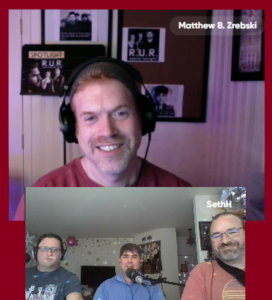 This month, we keep things close to home, which makes sense given that last month we were quite far from home. We go small like we’ve never gone before, diving into a local adaptation of R.U.R., or Rossum’s Universal Robots, by Karel Čapek.
This month, we keep things close to home, which makes sense given that last month we were quite far from home. We go small like we’ve never gone before, diving into a local adaptation of R.U.R., or Rossum’s Universal Robots, by Karel Čapek.